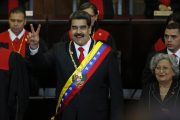
Judges at the International Criminal Court (ICC) on Friday issued arrest warrants for Russian President Vladimir Putin and for Russia’s Commissioner for Children’s Rights Maria Alekseyevna Lvova-Belova. The warrants accused Putin and Lvova-Belova of involvement in the crimes of “unlawful deportation of population (children)” and of “unlawful transfer of population (children),” as defined in articles 8(2)(a)(vii) and 8(2)(b)(viii) of the Rome Statute. This, by far the highest-profile action in the ICC’s two-decade history, was prompted by persistent allegations from the early days of the Russia-Ukraine war that Russians had been forcibly removing Ukrainian children from Ukrainian territory and taking them, without consent of relatives or Ukrainian officials, to reeducation camps in Russia, or farming them out for adoption by Russian caregivers.
While this action is largely symbolic, given the ICC’s limited enforcement options against the Russian superpower, the longer-term diplomatic and legal ramifications of these indictments are enormous. First of all, they have given legal imprimatur to the many accusations against Putin of war crimes, and thereby take away any chance at a negotiated settlement. Putin now knows that if he withdraws his forces or negotiates any kind of peace with Ukraine, he will remain a “war criminal,” subject to the humiliation of arrest, trial, and possible execution if he ever steps outside of Russia, retires, or is forced out of power by rivals eager to mend fences with the West. Losing the war, or even negotiating a compromise, are no longer options for Russia’s nuclear-armed dictator. As a result, Putin now has even more of an incentive to either win at any cost or to go down fighting, either of which would quite likely involve use of nuclear weapons for the first time since the end of World War II. After all, Putin now has nothing to lose. And with more such ICC warrants likely to be issued for Russian military commanders and for other members of Putin’s inner circle, neither do Russia’s military leaders or members of Putin’s circle of supporters.
As if this were not calamitous enough, the precedent established by the eventual arrest and trial of Putin, one of the world’s most powerful men, should his government be toppled by a coup, would go a very long way toward establishing the ICC as the irresistible criminal court of last resort. The hoped-for outcome on the part of Eurocrats and globalists everywhere would be some type of internal overthrow of Putin, followed by his delivery to global authorities as a condition for easing of economic sanctions. The spectacle of Putin in irons before a global tribunal, followed by his conviction and execution, would transform the ICC from an obscure organ for prosecuting Third World child traffickers into an unopposable global authority, the international “criminal court of last appeal” it was always intended to become.
This, of course, would be a grievous precedent for sovereign national criminal-justice systems such as our own federal court system. Such an invigorated ICC would be construed to supersede, where deemed necessary, the authority even of the U.S. Supreme Court. It must be remembered that in law, precedent is everything, and if the globalists can engineer the surrender of Putin to the ICC, they could surely do the same for some future globalist president wishing to do away with a presidential predecessor or vexatious rival. It is not at all hard to imagine, for example, a future President Biden-type handing over a Donald Trump or some other vanquished rival to the ICC on — ahem — trumped-up charges of one sort or another.
Beyond all of this, there remains the unfortunate and unprincipled acceptance of “victor’s justice,” which was first applied in modern times, under the camouflage of “international law,” at the trials of alleged Nazi German and Japanese war criminals. At the time, few Americans dared raise their voices against such a flagitious participation in “ex post facto law,” (criminalizing actions after the fact), despite the fact that such laws are prohibited by the U.S. Constitution. GOP Senator Robert Taft was a notable exception, telling an audience at Kenyon College in October 1946 that “the trial of the vanquished by the victors cannot be impartial no matter how it is hedged about with the forms of justice.” Taft went on to say:
About this whole judgment there is the spirit of vengeance, and vengeance is seldom justice…. In these trials we have accepted the Russian idea of the purpose of trials — government policy and not justice.
Years afterward, Supreme Court Justice William Douglas wrote:
No matter how many books are written or briefs filed … the crime for which the Nazis were tried has never been formalized as a crime with the definiteness required by our legal standards, nor outlawed with a death penalty by the international community. By our standards that crime arose under an ex post facto law. Goering et al deserved punishment. But their guilt did not justify us in substituting power for principle.
These words still ring true today. Unlike the ad hoc Nuremburg tribunal, the ICC is buttressed by the provisions of the aforementioned Rome Statute — but neither Russia nor the United States have ratified the statute, and neither have a number of other countries, including India, China, Indonesia, and Turkey. The Rome Statute, therefore, has no validity in any such countries, except as imposed from without. However horrifying and deserving of punishment the actions of Putin and his confederates may be, they do not justify embracing a novel international judiciary consecrated to the idea, utterly hostile to Anglo-American jurisprudence, that courts should be instruments of biased policy and not of impartial justice.




